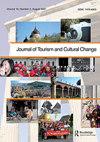The professional characteristics and networks of third-generation migrant returnees
IF 2.5
4区 管理学
Q2 HOSPITALITY, LEISURE, SPORT & TOURISM
引用次数: 1
Abstract
ABSTRACT This study examines the professional characteristics and migrant networks of Korean–Chinese returnees. A notable feature of the current Korean–Chinese migrant group in Korea is the emergence of third generation tour guides. The in-depth interviews with 12 third generation Korean–Chinese tour guides were conducted and analyzed within the grounded theory framework. A total of 110 concepts in 27 subcategories making up 11 main categories are derived. The results of axial coding indicated that the causal condition was ‘to become a tour guide in Korea’. The central phenomena that have been emerging in the characteristics and migrant networks of third generation Korean–Chinese tour guides are ‘nostalgia’ and ‘our stressful life in Korea’. Contextual conditions are ‘socio-cultural distance’ and the ‘vulnerabilities of the job environment’, while the intervening conditions are ‘transnational networks’, ‘use of SNS (Social network system)’, ‘colleagues like family’, and ‘comfortable life’. Actions/interactions are moderated by ‘migrant networks’ and consequences are shown to be ‘identity formation’. The core category of this study is thus ‘embracing socio-cultural realities and forming diverse identities through migrant networks’. This study provides theoretical and managerial implications for the sustainable and professional characteristics and migrant networks of third generation Korean–Chinese tour guides.第三代移民回返者的职业特点和网络
摘要本研究考察了韩中归国人员的职业特征和移民网络。目前在韩国的韩中移民群体的一个显著特点是出现了第三代导游。对12名第三代韩中导游进行了深入访谈,并在扎根的理论框架内进行了分析。共衍生出27个子类别中的110个概念,构成11个主要类别。轴向编码的结果表明,因果条件是“成为韩国导游”。第三代韩中导游的特点和移民网络中出现的核心现象是“怀旧”和“我们在韩国的紧张生活”。背景条件是“社会文化距离”和“工作环境的脆弱性”,而干预条件是“跨国网络”、“社交网络系统的使用”、“像家人一样的同事”和“舒适的生活”。行动/互动由“移民网络”调节,其结果显示为“身份形成”。因此,这项研究的核心范畴是“拥抱社会文化现实,通过移民网络形成不同的身份”。本研究为第三代韩中导游的可持续性和职业特征以及移民网络提供了理论和管理启示。
本文章由计算机程序翻译,如有差异,请以英文原文为准。
求助全文
约1分钟内获得全文
求助全文
来源期刊

Journal of Tourism and Cultural Change
HOSPITALITY, LEISURE, SPORT & TOURISM-
CiteScore
5.10
自引率
9.10%
发文量
31
期刊介绍:
Journal of Tourism and Cultural Change ( JTCC ) is a peer-reviewed, transdisciplinary and transnational journal. It focuses on critically examining the relationships, tensions, representations, conflicts and possibilities that exist between tourism/travel and culture/cultures in an increasingly complex global context. JTCC provides a forum for debate against the backdrop of local, regional, national and transnational understandings of identity and difference. Economic restructuring, recognitions of the cultural dimension of biodiversity and sustainable development, contests regarding the positive and negative impact of patterns of tourist behaviour on cultural diversity, and transcultural strivings - all provide an important focus for JTCC . Global capitalism, in its myriad forms engages with multiple ''ways of being'', generating new relationships, re-evaluating existing, and challenging ways of knowing and being. Tourists and the tourism industry continue to find inventive ways to commodify, transform, present/re-present and consume material culture. JTCC seeks to widen and deepen understandings of such changing relationships and stimulate critical debate by: -Adopting a multidisciplinary approach -Encouraging deep and critical approaches to policy and practice -Embracing an inclusive definition of culture -Focusing on the concept, processes and meanings of change -Encouraging trans-national/transcultural perspectives
 求助内容:
求助内容: 应助结果提醒方式:
应助结果提醒方式:


